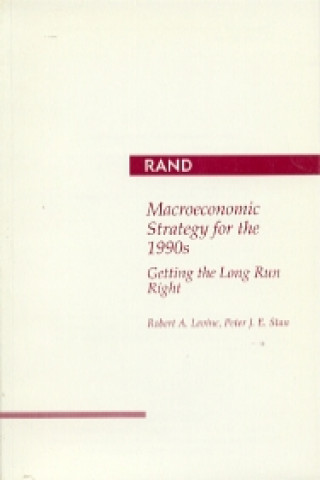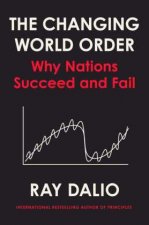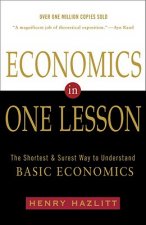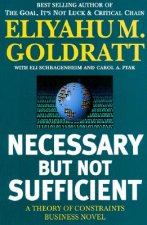
Kód: 04733427
Macroeconomic Strategy for the 1990s
Autor Robert A Levine, Peter J. E Stan
The central economic debate for the first half of 1993, couched in terms of short-run economic stimulus versus long-run deficit reduction was misleading for U.S. long-run strategy. Our long-run depends on growth, but economic grow ... celý popis
- Jazyk:
 Angličtina
Angličtina - Väzba: Brožovaná
- Počet strán: 46
Nakladateľ: RAND, 1995
- Viac informácií o knihe

20.74 €

Skladom u dodávateľa v malom množstve
Odosielame za 10 - 14 dní
Potrebujete viac kusov?Ak máte záujem o viac kusov, preverte, prosím, najprv dostupnosť titulu na našej zákazníckej podpore.
Pridať medzi želanie
Mohlo by sa vám tiež páčiť
-

Technologies of Memory in the Arts
70.73 € -

Catalysis
537.98 € -

Marxism of Che Guevara
51.20 € -

Ein Paradies aus Nichts
15.43 €
Darujte túto knihu ešte dnes
- Objednajte knihu a vyberte Zaslať ako darček.
- Obratom obdržíte darovací poukaz na knihu, ktorý môžete ihneď odovzdať obdarovanému.
- Knihu zašleme na adresu obdarovaného, o nič sa nestaráte.
Viac informácií o knihe Macroeconomic Strategy for the 1990s
Nákupom získate 51 bodov
 Anotácia knihy
Anotácia knihy
The central economic debate for the first half of 1993, couched in terms of short-run economic stimulus versus long-run deficit reduction was misleading for U.S. long-run strategy. Our long-run depends on growth, but economic growth does not have the close relationship to deficit reduction that is frequently asserted, and deficit reduction should not become the central objective of economic strategy that it is becoming. It has been asserted that: (1) U.S. productivity is decreasing, but the record of the 1980s does not bear this out; (2) productivity increases depend on increased investment in business plant and equipment, but technological change and associated factors like education are important; and (3) investment in U.S. plant and equipment has been decreasing because of decreased American savings caused by increased deficits, but investment has not been decreasing, although more of it has been financed from abroad. In any case, increased consumption is frequently a better way of increasing investment than is increased saving. The drive to cut the deficit may thus exert a long-run downward pressure on growth and employment. Further, it may also cut back public expenditures for infrastructure and other needs, which may be as important for growth as private investment. None of this means that the deficit should be ignored. It does mean that it should be put into proper proportion relative to the total of the factors needed to encourage economic growth.
 Parametre knihy
Parametre knihy
Zaradenie knihy Knihy po anglicky Economics, finance, business & management Economics
20.74 €
- Celý názov: Macroeconomic Strategy for the 1990s
- Podnázov: Getting the Long Run Right
- Autor: Robert A Levine, Peter J. E Stan
- Jazyk:
 Angličtina
Angličtina - Väzba: Brožovaná
- Počet strán: 46
- EAN: 9780833014498
- ISBN: 0833014498
- ID: 04733427
- Nakladateľ: RAND
- Hmotnosť: 113 g
- Rozmery: 225 × 159 × 4 mm
- Dátum vydania: 30. June 1995
Obľúbené z iného súdka
-

Principles for Dealing with the Changing World Order
23.30 € -9 % -

Team Topologies
23.91 € -12 % -

Freakonomics
9.09 € -10 % -

Misbehaving - The Making of Behavioral Economics
10.62 € -11 % -

Indispensable Milton Friedman
29.43 € -

Little Book of Economics
11.13 € -23 % -

Why Nations Fail
11.23 € -13 % -

Pyramid Principle, The
47.22 € -

Essential Mathematics for Economic Analysis
73.08 € -1 % -

Economics In One Lesson
15.73 € -23 % -

Predictably Irrational
14.91 € -19 % -

Price of Inequality
10.52 € -22 % -

(Mis)Behaviour of Markets
14.40 € -23 % -

Debt, 10th Anniversary Edition
28 € -22 % -

A-Level Economics: Year 1 & 2 Complete Revision & Practice (with Online Edition)
28.31 € -9 % -

The Invisible Hand
7.96 € -22 % -

Liar's Poker
13.69 € -

Rational Optimist
13.69 € -

Irrational Exuberance
20.43 € -8 % -

Art of Statistics
10.93 € -24 % -

Scrum - A Pocket Guide - 3rd edition
22.79 € -4 % -

Hypomanic Edge
21.05 € -13 % -

How I Made One Million Dollars Last Year Trading Commodities
41.29 € -19 % -

Misbehavior of Markets
24.63 € -

Econometric Analysis, Global Edition
86.47 € -

Cartoon Introduction to Economics
19.72 € -8 % -

Economics: The User's Guide
12.87 € -24 % -

Rise of Carry: The Dangerous Consequences of Volatility Suppression and the New Financial Order of Decaying Growth and Recurring Crisis
27.69 € -16 % -

Myth of Capitalism - Monopolies and the Death of Competition
23.19 € -20 % -

How Rich Countries Got Rich and Why Poor Countries Stay Poor
16.55 € -23 % -

Business Etiquette in Brief
13.18 € -18 % -

Intermediate Microeconomics and Its Application
105.69 € -

Discovery, Capitalism & Distributive Justice
22.89 € -

Are the Rich Necessary?
13.28 € -1 % -

Economic Point of View
28.20 € -

Driving Digital Transformation
21.97 € -23 % -

Start-Up Nation
9.09 € -24 % -

Economic Facts and Fallacies
16.96 € -20 % -

Decision Book
19 € -2 % -

Necessary but Not Sufficient
17.16 € -18 % -

Freakonomics
6.12 € -24 % -

Economics Book
21.15 € -16 % -

Leading at a Higher Level
34.54 € -

Principles of Economics
15.83 € -13 % -

Macroeconomics For Dummies
24.83 € -5 % -

45 Second Presentation That Will Change Your Life
9.91 € -19 % -

Economics of the Public Sector
69.30 € -10 % -

Factfulness
10.21 € -24 % -

Currency Wars
15.83 € -16 %
Osobný odber Bratislava a 2642 dalších
Copyright ©2008-24 najlacnejsie-knihy.sk Všetky práva vyhradenéSúkromieCookies


 21 miliónov titulov
21 miliónov titulov Vrátenie do mesiaca
Vrátenie do mesiaca 02/210 210 99 (8-15.30h)
02/210 210 99 (8-15.30h)